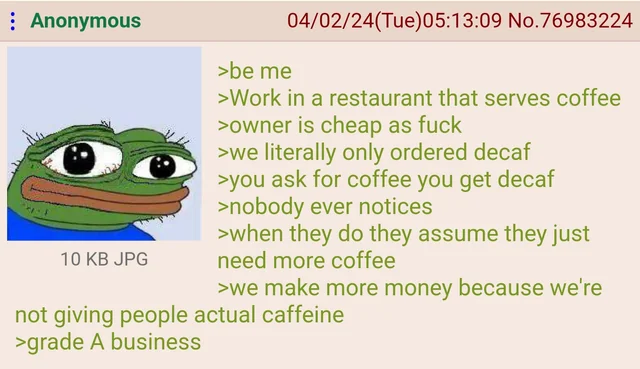this post was submitted on 02 Aug 2024
642 points (98.8% liked)
Greentext
4816 readers
1901 users here now
This is a place to share greentexts and witness the confounding life of Anon. If you're new to the Greentext community, think of it as a sort of zoo with Anon as the main attraction.
Be warned:
- Anon is often crazy.
- Anon is often depressed.
- Anon frequently shares thoughts that are immature, offensive, or incomprehensible.
If you find yourself getting angry (or god forbid, agreeing) with something Anon has said, you might be doing it wrong.
founded 1 year ago
MODERATORS
you are viewing a single comment's thread
view the rest of the comments
view the rest of the comments

They're probably more similar, but there's no way they can mimic that distinctive alcohol smell (same smell in wine and liquor). I'd take a bet any day that I can distinguish any AF from regular beer, provided the regular beer is at least the typical 4-5% ABV.
Oh I don't dispute people can distinguish it by taste. Like I said, if not informed of the possibility that the beer is NA (or the coffee decaf) most people won't notice. When informed of the possibility less than half of people can distinguish it relyably.
But most people are shure they would distinguish the taste any day of the week, and the chance is biggest that they can't.
I still find that surprising, do you have stats that you can link?
The smell of alcohol alone is very distinctive, so I don't think most would need to even taste it to know it's AF. It might fool them if it's served in an area with a lot of alcoholic drinks nearby, but even then a quick sniff should make it plainly obvious to me and, I assume, most people. I don't have a particularly keen sense of smell (my wife smells a lot of stuff I don't notice), so I don't think I'm special here.
Most of it is from personla experience, however there have been some areas of research in the matter
https://www.ncbi.nlm.nih.gov/pmc/articles/PMC6286248/#R51
https://onlinelibrary.wiley.com/doi/epdf/10.1111/j.1360-0443.1988.tb03979.x
For instance, people do genrally even exihibit 'drunken' behaviour, even though they have had no alcohol.
But genrally people are very addamant they can distinguish by taste their 'own' brand from others. If you do a blind taste test of lagers you'll find out that most people are not able to pick their preferred brand. This is also not only amateurs, even sommeliers get fooled easily: https://www.realclearscience.com/blog/2014/08/the_most_infamous_study_on_wine_tasting.html
Taste is just very difficult and personal. Thats why people are overly confident on their own taste, but generally people tend to mimic each others tastes, as the Sideways movie tanked interest in Merlot and increased interest in Pinot Noir https://winebusinessanalytics.com/features/article/61265/The-Sideways-Effect .
Like I said some people are very good at tasting, but generally people overestimate their abilities, a true blind taste test is very fun and informative. You should do it with friends!
That first one is really interesting. The second just talks about reduced alcohol beer, and it's a lot harder to tell the quantity of alcohol by smell/taste than the presence of alcohol. But swapping something out with a beverage with no alcohol is a completely different story, so I have to assume it's because it's in a social atmosphere where other alcoholic beverages are present, so smell isn't reliable and taste is secondary (they're focused on the conversation, not the drink).
Yeah, I've read/seen studies about just that, and I think it's hilarious that the main difference between an expensive and cheap wine is branding. But distinguishing drinks by taste is different from determining whether a drink has alcohol.
As an anecdote, my brother went to a wedding reception while underage and there were two bowls of juice, one spiked and one not. He accidentally got the spiked punch, tasted it, and wondered why it tasted funny, at which point my parents noticed he got juice from the wrong bowl. He didn't know what to look for (he was like 10 at the time), but he knew something was off.
So I think if you take away the "distractions," it'll be very easy to tell whether a drink is alcoholic. But maybe I'll give it a try and do a blind test. I don't think I'll even need to get to the tasting part, the smell alone should be enough to distinguish alcoholic from non-alcoholic beverages.